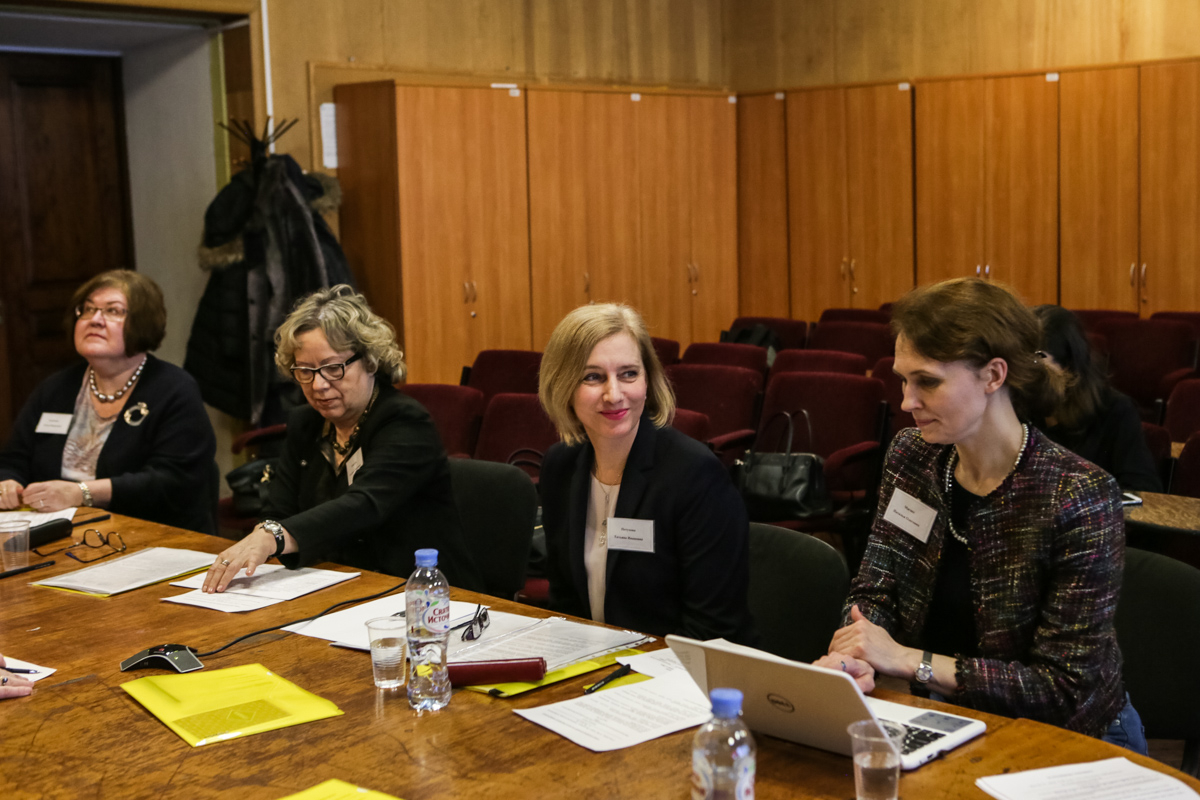Board Meeting of Educational Program Language and Culture of the UK and USA Held at SPbU

The Board of the Main MA Educational Program ‘Language and Culture of the UK and USA’ held its first meeting at SPbU.
The meeting was participated by SPbU and Keele University (UK) teaching staff and employer organizations, i.e. the State Hermitage, Consulate General of Denmark, Communication Center Consulting Company. The meeting was chaired by Tatyana Emelyanova, Member of the Board at St. Petersburg Association for International Cooperation; Director for International Programs at English-Speaking Union of Russia.
Elizaveta Khomyakova, DSc, PhD, Professor, Chair of English Language Studies Department at SPbU, spoke about the MA educational program Language and Culture Studies of the UK and USA. The program was launched in 2014 and every year since then the number of its applicants has been increasing. Today competition is as high as some six applicants per vacancy. The program teaches students with all kinds of backgrounds – from linguistics to physics. Professor Khomyakova noted that enrollment requirements to the program have always been competitive: over time the entry exam included translation of a dialect-specific text without using any dictionaries, writing a summary to such a text or a comprehension task, not to mention English grammar tests.
Language is always influenced by multiple factors. It has cultural value, which means that it always bears am imprint of a specific culture that is native to its speakers. Language and culture studies is the foundation to study culture of a foreign language and translation.
Elizaveta Khomyakova, Professor, Chair of English Language Studies Department at SPbU.
Master students are engaged in research on various issues. Their theses cover such issues as language representation of the fall of the Berlin Wall, Brexit (UK leaving the EU) as a cultural value in English sociopolitical discourse, language of confrontation in the presidential campaign of Donald Trump, and so many others.
Professor Khomyakova was grateful to members of the Board for their contribution to the University success, noting that ‘you are more than just observers who are idly standing by; you are stakeholders, who represent our professional community. Most of you are our long-standing partners as members of the board of assessors at university final exams; so, you are well familiar with our graduates and students’.
Natalia Magnes, Assistant Professor at the English Language Studies Department, spoke about the new subject on the curricular Language and Culture of Canada, Australia, and New Zealand, developed by younger members of the teaching staff. ‘The global need for more intensive communication and globalization trends compel everyone to study English language as a tool of international communication’, Natalia Magnes explained. ‘The geography of English language spoken as a national language is indeed vast, therefore speakers from different parts of the world transform English to adjust it to their specific cultural environments, traditions, and needs. Scholars refer to English as a polycentric language which is today represented by several different national varieties; each of them has its unique structural and functional aspects’.
A professional university education in English as a foreign language and translation implies that students are well read in national varieties of English spoken in different parts of the world. SPbU has introduced Language and Culture of Canada, Australia, and New Zealand, as well as an obligatory course in UK and US Studies.
Country studies is a field of knowledge demonstrating national and cultural aspects of communication among native speakers of a specific language; the objective of this subject is to promote language-specific communicative skills in students.
Natalia Magnes was passionately grateful to Dr. Alison Long, head of Contemporary Language program at Keele University. Madam Long visited SPbU and delivered a course of lectures on British studies; colleagues admitted that at each lecture the room was full to the very doors. Alison Long is going to be back to SPbU later this year.
The meeting was concluded by Tatyana Petukhova, Assistant Professor, English Language Studies Department at SPbU, who presented internships available to students of the program. Over the first three semesters students participate in a translation internship, followed by a teaching internship in the third semester. Tatyana Emelyanova, Chair of the Board, suggested a framework for future partnership in this respect; students could be engaged not only as translators, but also as researchers to cooperate with English speaking delegates who are hosted in St. Petersburg by the Association for International Cooperation.
The next meeting is scheduled for Autumn 2018. Members of the Board are going to exchange e-mails to formulate the meeting agenda.

